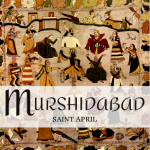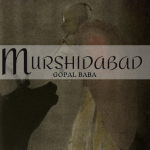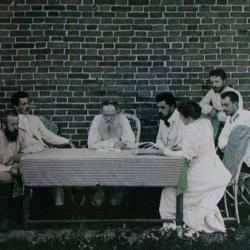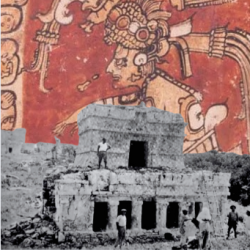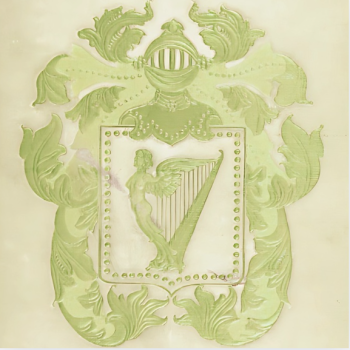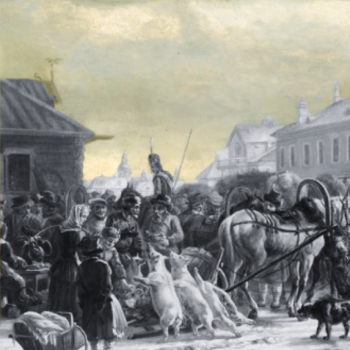HOW THE NAWAB’S ARMY WAS KIDNAPPED
Charles Johnston
April 1, 1889.
“Huzoor!” said the corporal of the Treasury guard in that ridiculously squeaky voice of his, as he saluted with an air of respectful apprehension; “the men of the Nizam Bahadur are at the door.”
“Very good,” I answered. “Are we all ready for them, Babu?”
“Quite ready, sir,” said Dinanath Babu, the Treasurer.
We were seated at the table in the Treasury chamber, which was abominably hot and stuffy, strongly smelling of spider-webs and bats; abominably hot, though it was only late March, and the hot season had nearly three months to run, through the gamut of hot, hotter, hottest, before we got to the hot wet blanket of the greater rains.[1] Stuffy and dingy and abominably hot; not in the least suggesting Oriental treasure or the halls of Aladdin. Merely a big, grubby, ill-lighted room on the ground floor, that looked as if it had been last white washed in the days before the Mutiny of 1857—and, by the way, it was in these very barracks, ever since given up to civil uses, that the great Mutiny began.
Nothing at all to suggest Oriental treasure. Never a bowl of rubies or a cup of gold. But we had plenty of treasure there, none the less. There were eight huge sea-chests around the room, each with two big padlocks of different shapes. One key I had, as Treasury Officer. Dinanath Ganguli, as Treasurer, had the other.[2] It was the same with the outer door. So neither of us could get into the room or the big sea-chests, unless the other were present; and as I was not very likely to assist Dinanath to loot, and as Dinanath was not very likely to assist me, the paternal government felt reasonably safe.
Yet we had, as I say, plenty of treasure well worth any man’s looting. For in each sea-chest, stacked around cavernous inside, were thirty columns of little bags, made of closely netted whipcord, ten bags to the column; and in each bag a thousand silver rupees, like white fish glinting in the net. Ten thousand rupees to the column; three hundred thousand—three lakhs—to the chest; and eight chests in all. Nor was that all. We had also a sheaf of high-denomination notes, and a bag of gold mohurs; say in the neighborhood of three millions. And the men of the Nizam were at the door heavily armed with service rifles, and determined to carry off a substantial portion of our treasure.
The corporal with the shrill voice, was, as I have said, apprehensive. Dinanath Babu was perfectly cool. I was not; far from it. I was abominably hot, in spite of a very light suit of tussore silk. Hot, and decidedly uncomfortable.
Yet the cause of my discomfort was not the presence of these ferocious armed Muslims at the door, nor my certain knowledge that they would never depart empty-handed, although that might seem cause enough. What really fretted me was that visitation of Providence called prickly heat, deployed in loose order on my shoulders and spine. Truth to tell, in the face of that armed force, I was as little disturbed as Dinanath himself, and even the timidly saluting corporal was nervous from quite other reasons. Suddenly wakened on guard, he had forgotten part of his accoutrements, and had come into the presence incomplete.
Discipline must be vindicated.
“Corporal! Go and get your belt!”
He went, very shamefaced, and returning, once more made the announcement—
“Huzoor! The men of the Nizam Bahadur are at the door.”
We were, as I have said, altogether unafraid, even the corporal. We had expected them, and were prepared.
“Bid the Nizam’s sergeant enter.”
The corporal saluted, withdrew, and immediately returned, escorting Khoda Baksh, the Nizam Bahadur’s sergeant, in his curiously irregular-looking uniform: dark green tunic, whitish trousers, and white turban with a green tassel. Long, pointed shoes and a sword-bayonet completed his rig.
The sergeant stood before the table and saluted me with grave dignity. He was magnificent in his huge, fuzzy whiskers and dark serious eyes. I fitly responded to the salute.
“Huzoor!” said the sergeant. “We have come for the money for the Nizam Bahadur.”
“Very good, sergeant. You have the paper?”
He fished it out of his breast pocket. The paper demanded so many thousand rupees in notes, so many thousands in silver, and a few score in coppers, annas and pice: twenty thousand rupees in all, which should go to the up-keep, for the term of one calendar month of the Palace, the Nizamat buildings and College, the maintenance of many younger brothers, nephews, nieces, sisters, cousins, and aunts of the Nizam. It was, in fact, the pension of His Highness, duly payable under treaty between his family and the paternal government. We paid it to him on the first of each month.
The counting of the money was a ritual in itself. We began it in this way: Dinanath, going to one of the sea chests, already opened by its two several keys, heaved forth one of the network bags. Bringing it to the table, behind which I sat, and before which stood the Nizamat sergeant, he untied and unwound the string that confined its throat, and turning it about, poured a little pile of silver rupees on the table. Thereon I stretched forth my hand, and took, first, the paper which contained the history of that particular bag, duly signed by myself, and then a big handful of rupees. From these, with the right hand, he counted out little piles of ten, each time taking just five between fingers and thumb, until five little piles stood on the table, the sergeant meanwhile following with alert, serious eyes.
Then a big pair of scales was set on the table, splendid in nickel and brass, and into one scale I put the counted fifty rupees, to serve as a weight, pouring rupees into the other from a loose handful, until the scale-pan just moved and remained evenly poised. That made our first hundred, which was then used as a weight, against which nine handfuls were successively balanced, until the first thousand was completed. Satisfactorily, it came out exactly even, tallying with what was written in the bag.
So we weighed out the remaining thousands required to be in silver, added certain thousands in high denomination notes—hundreds and fifties—and topped off with a box of mint-new copper annas and pice, the former sixteen to the rupee, the latter, four to the anna. There is a still smaller copper coin, a tiny piece called a pie; of these we added a quart or so, to be given in largesse to the needy; for the Nizam Bahadur had a charitable heart, and giving is still one of the cardinal virtues in India.
Then the sergeant and Dinanath and the corporal, duly recalled to that end, heaved the whole twenty thousand in their arms, and we went outside to load it on the bullock-wagon. As we appeared in the blistering sunlight, the army rose to its feet from the grass and saluted, all ten of it, with admirable discipline and alacrity. Its uniform was like the sergeant’s, lacking stripes and sword-bayonet, and with Enfield rifles and cartridge-pouches added. Altogether, an admirable little army, adequate to the responsible duty of convoying twenty thousand rupees up the long red road under the coconut palms to the Nawab’s palace.
When the sergeant had signed the receipt in duplicate, with my own counter-signature and Dinanath’s pointed handwriting added in confirmation, the sergeant shouted, “‘Tshun!” in his best English, followed immediately by “Marsh!” and the bullock-cart, with five of the army on either side and the sergeant guarding the rear, set forth on its northward march heralded by a frightful shriek from an ungreased axle; a horrid, blood-chilling shriek repeated with damnable iteration, though happily sinking to desperate feebleness through distance, as the bullock-cart swung around the corner under the big banyan tree and made its way along the Burra Lal Dighy, which is to say the Great Red Tank, red corresponding to the primitive ideal of beauty. I am well persuaded that as soon as the civil station was out of sight, the whole army mounted on the bullock cart, the fuzzy sergeant included, and that, thus arranged, the cortège crawled its leisurely way northward beneath the palm trees. I don’t suppose the bullocks found this proceeding at all out of the ordinary, or to be resented. Their minds had never been disturbed by rumors of the Royal Humane Society.
As soon as things were fixed up in the Treasury, we turned the keys in our double locks; and, metamorphosed from Treasury Officer into Assistant Magistrate, I went off to another dingy room to try Abkari cases.
Tiffin made a pleasing interlude, and by five the day’s work was done. Sundry malefactors were laid by the heels. Sundry others were let loose and all was well.
We had cholera through the district, and up and down the Ganges valley, and were to have it five weeks more till the monsoon clouds gathered like a thick gray veil across the blazing face of the sky, and burst in the swish and swirl and thunder of the greater rains. The water was bad; the Bhagirathi River was shrunk to a brown trickle across shimmering sands, thirsty for the melting of Himalayan snows.[3]
I strolled over to the club, through a meadow rank with “thief thorn” grass, which fastened itself abominably in one’s socks and trouser legs, to watch the tennis. I saw Martha wheeling little Theo Ritchie in her perambulator. Martha was not, as might be supposed, a nursemaid; Martha was a huge, black-bearded Muslim, one of Ritchie’s chaprassies, a dozen of whom, with red button-shaped turbans and big brass plaques of office on their breasts, stood about his throne to do his errands.[4] At the club I found, to my joy, that Margie Ritchie, the “Collector Mem-Sahib,” was dispensing tea. I asked her why a big, black-whiskered Muslim, who could have led a charge of cavalry, should bear the gentle name of Martha. The lady replied, with her charming smile, “Oh don’t you see? Because he is careful and busied about many things!”[5] A cup of her fine Darjeeling and a cigarette allayed the pang of mortality and even soothed my prickly heat, and finding a cool seat on the veranda, I began a spirited flirtation with little Maud Livesay, youngest of the four Livesay maidens, and a particular friend of mine.[6]
“Watch Mabel!” she said. “Isn’t she playing splendidly!” Golly! Look at that serve!”
Mabel’s partner was the young Maharaja of Kasimbazar with sixteen summers to his credit, and a pedigree that went back to the Ramayana. We and the Colonnas and the O’Neills are all parvenus by comparison. A charming boy, with light golden skin, smooth as silk, beautifully formed hands, and bright devilishly mischievous eyes. A ripping tennis-player, too, cool and quick and agile as steel. At receptions and parties he wore pounds of gold-lace strewn thick as treacle over his blue velvet tunic, with diamond buttons as big as filberts. But now he was in plain white, save for a jaunty little cap of cloth of gold.
He and Mabel Livesay were knocking things about, all their own way. They were beating Wintle, the Junior Police Sahib, and young Ali Mirza, a Nizamat nephew, into a cocked hat; and it was not the fault of Ali Mirza.[7] In spite of his superb clothes, green satin trousers, scarlet satin jacket, and blue and gold cap, he was all over the court, a cross between a rainbow and a lightning-flash, but it was all no use. Young Wintle—a conceited young ass, most of us thought him—fumbled every ball that came his way, and lost more points than even his many-colored partner could make up. Watching that party-colored set, I fell amusing.
Oh, most benevolent and wonderful British Indian Government, what a miracle of assimilation you accomplish here!—a Hindu prince whose family was old and splendid when Romulus founded Rome; one of the wild, conquering Muslims; a fine and haughty Briton like young Wintle—a touch of irony here; and, fourth, a Eurasian girl. An awfully nice girl; everybody liked Molly; but a Eurasian. Her grandmother was a Bhootia woman; the dear old mother’s high cheek-bones showed it, and Livesay too, with his nice gray whiskers and honest face, had at least a touch of native blood. Truly, a miracle of assimilation!
“I say!” Little Maud was speaking.
“Yes, Maud?”
“Don’t they play well together?—Mabel and the Maharaja, I mean. I say—?”
“Yes?”
Maud cocked her little, dark head comically on one side.
“Isn’t it a pity he can’t marry her?”
“Who can’t marry who, Maud?”
“Why, I’ve just said!” Mabel and him, of course.”
“The Maharaja?” I was genuinely taken aback. What a fancy the child had!
“Of course!” she said; “Mabel and him. And then I’d be a princess, and live in a palace, and, oh, yes—”
“Well?”
“You could come and visit me, and—bring me sugar-plums.”
“Oh, but I couldn’t, Maud. For you’d be a Hindu princess, and you know they don’t have visitors—except lady visitors, of course.”
“Yes,” Maud answered incisively. “Isn’t that such stuff! But Mabel’d change all that. See if she wouldn’t! And then you could come.”
“I’ve got an idea, Maud.”
“Yes?” she queried.
“I’m sure he’s younger than Mabel, and that, you know, would never do.”
“Oh, of course!” she answered. “I never thought of that. As Shakespeare says, ‘Let the woman take—?”
“Just so, Maud. Now, supposing you married him yourself, instead of Mabel. You’d be a real princess then.”
“Now you’re talking rubbish,” said Maud severely.
It could not be denied. I was.
The set ended and we all dispersed, the station folk going to dress for dinner, while the visitors drove off. The little Maharaja had a high English dog-cart which he drove himself, and he went off at a spanking trot behind a “Waler.” We saw him whirl off into the twilight as we turned toward our bungalows, some of us walking, others driving.
We dined that evening, as it happened, at the Ritchie’s kuti.[8] The whole station was there, including Livesay and Mabel. Livesay, by the way, was our Civil Engineer, of Rivers and Roads.
I sat next Mabel, and was talking to her about Maud; also about the other two little sisters, Ethel, and Meta, when we heard a horse come thundering along the side of the square at a hand-gallop, and stop sharply, with a rush of scuffling feet, at the Collector’s door. We all stopped talking, and looked at Ritchie. Martha came in and, bending down, whispered something to him in Hindi. Ritchie started.
“What?” he said. “The deuce you say!”
Martha repeated. Ritchie rose, rather hastily for a man in general so cool and poised, and went out into the front room, a kind of in formal office opening by wide doors on the veranda.
Two minutes later, he reappeared at the door of the dining-room. I caught his eye. He signed to me to come, and disappeared again. Hastily making my excuses to Mabel and Margie Ritchie, I went to the front room, in no small wonder.
Was it a murder or a dacoity or an uprising? Anything may happen, anything may spring up to the surface the still, dark river of Indian life that runs so unfathomably deep.
“I say!” Ritchie ejaculated, in a voice for him very excited, though his tone was low. “Here’s a pretty pair of shoes!” What do you think has happened?”
I ventured no guesses.
The Nizam’s pay hasn’t arrived. They waited two or three hours beyond the usual time, and then sent men out to look. Not a sign! So they’ve sent a fellow here.”
As Treasury Officer, I took that to heart. Short of the looting of the Treasury, nothing more serious could have happened. You got it sent off alright, didn’t you? Who came for it?”
“The usual chap—Khoda Baksh, I think his name is. Yes, Khoda Baksh, the big up-country chap with the fuzzy beard.”
“I know. Well, he’s gone. Sunk into the earth, and the whole Nizamat guard with him—to say nothing of the bullock cart, and twenty thousand rupees. There were notes, of course?”
“Yes, about the usual amount.”
“Well, we must stop them at once.” You can get the numbers first thing in the morning. But the silver—Better take my tum-tum and drive to the palace. See if you can find any traces—and reassure the old gentleman. I’ll tell them to harness the tum-tum. Take these two chaprassies with you. Better take this, too,” and he drew a revolver from the drawer of the desk. “Though it’s inconceivable to me that there’s been violence. You have your light overcoat?”
Within a quarter of an hour I was driving, as fast as Ritchie’s fine trotter could carry me, up that long road beneath the coconut palms, where the fateful bullock-cart had disappeared in the hour before noon. There was no moon, but the stars were gleaming in the purple night, big stars, like colored lamps, hanging down clear from the background of the sky. I drove almost directly toward the Pole Star, hanging low among the palm trees, covered now and then, by a dark, waving frond. It was an extraordinary drive. No one spoke. The bare fact I knew, and doubtless the Nizam’s messenger had told it all, with such embellishments as might occur to him, to the chaprassies and syces. So we were all thinking about it tremendously, though no one spoke.
As I have said, short of revolution, nothing more catastrophic could have happened in that quiet district. Twenty thousand rupees gone in broad daylight! Even divided by twelve—allowing a share and a half for the sergeant, and a half-share for the bullock-driver—it would make the fortune of every man in the Nizamat army. Were they, with Khoda Baksh at their head, making their way across country, under cover of the night, toward the forests of the Santal Hills?
But those high-denomination notes—no one in his senses would try to make off with those! And for the life of me, I could not think of Khoda Baksh as a highway robber; no, nor those honest Muslims of the army either. In the way of loot, yes. But when it was entrusted to them, never.
Then what the mischief could have happened? A raid of wild Hillmen from across the railroad? They used to raid, in the old days. But could a sufficient band conceivably get right into the very heart of the district, without our hearing of them? And the Nizamat guard was fully armed, good Enfield rifles, with ten or twenty rounds of ammunition each; I knew the details for I made out their licenses “to have and carry arms.” To knock out ten men, well-armed with rifles, even if a surprise volley had been poured into them, would mean something of a battle. And a battle like that, in broad daylight too, could hardly take place without some echo of it reaching us; indeed, it would instantly start a wild panic, a tornado. Yet, until the Nizamat outrider came, not a sound, not a whisper even, on the stillness of the Indian night! The whole thing was astonishing, inconceivable.
So the thing stormed around the chambers of my mind, as I sent Ritchie’s trotter along that arrow-straight road; red brick, pounded and rolled, what we call a “pukka” road; “baked” that is, the Indian word for anything matured and authentic. It stormed about my mind; yet I remember that, just as the quiet heavens with the big, silent stars, looked down on us, very serenely, so there was that in me that looked down on the turmoil of thoughts and guesses, very serene: “Why all this stir, little man!”[9]
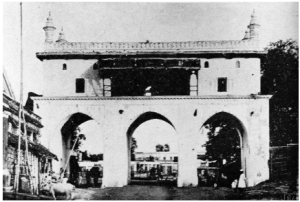
Tirpaulia Gate.[10]
I made a change of horses at the half-way stable, drove past the big, heavy gates of the little Maharaja’s enclosed courtyard and palace, and presently entered the big, imposing doorway of the Nizamat buildings.
I noticed that the guard-house was curiously empty and still. It suddenly flashed into my mind: “Of course! The army is gone!”
It was about ten by that time. Lights were moving among the buildings, and, hurrying up the main stairway, I found the great reception room brilliantly lighted. On the ivory-rimmed sofas and in gilded chairs, dark gentlemen, brilliantly clad, were seated—inwardly perturbed, outwardly calm. In the midst sat His Highness himself, grave as always, pensive, rather full of pathos, and, tonight, palpably discomposed.
The words of Arjuna in the Bhagavad Gita flashed into my mind—it was not so long since my Sanskrit “exams”—I behold fathers, sons, and grand-sires, uncles, fathers-in-law, wives’ brothers, kinsmen,”—the whole Nizamat family of the sterner sex. The sisters, cousins, and aunts, being zenana ladies, were naturally missing. Each gentleman, saving only the Nizam, had a little leather bag, like a Tyrolese tobacco-pouch, on his knee or in his hand. The scene was eloquent: they had come for their share of the monthly pay.
As I stood in the doorway, while, led by His Highness, they all ceremoniously rose, it suddenly flashed into my mind that I had been so busy guessing at the mystery, that I had not given a thought to what I was to say. It was in effect, “Do not be alarmed, gentlemen. You will get your money alright. Never fear!”
I was very much embarrassed in face of those serious dark gentlemen, the youngest of whom was several years my senior. And to this day I do not re member in what terms I made the explanations and assurances. One thing only emerged clearly: the army had not arrived; the twenty thousand rupees were gone.
Even before I left the civil station, Ritchie had set the police in motion throughout the district, and had sent a runner to the nearest telegraph station, which was fifteen miles away, to notify the Calcutta Treasury and the Bank of Bengal. For Ritchie the thing was serious in every way. He was answerable for everything within the district, and particularly for the financial side of things. And twenty thousand rupees meant a full year’s pay. But it was inconceivable—yes, of course! But still the money was gone. That fact there was no getting over.
I got back to the station after midnight. Early the next morning, I set forth to try to get on the track of the missing army, a thing impossible in the darkness of the night before. I found it a horribly embarrassing thing to do. Of course it was all very easy to drive leisurely up the red road beneath the coconut palms, carefully scrutinizing the road and its sides for traces of a scuffle, or for wheel-tracks going off in to the jungle. Off the pukka roadbed the ground was soft enough; the ruts and footprints would have been very conspicuous. But they were not there.
That part of it, as I say, was easy enough. But when it came to knocking at the door of a Bengali notable, and asking him if he had seen the missing army; asking this, in a tongue one spoke haltingly, of people with keen, sarcastic eyes—that was a job that made me squirm.
Fortunately, most fortunately, I had Martha with me. He had all the aplomb I lacked. He was a Muslim. Bengali notables didn’t bother him. Indeed, his assurance, his self-confidence, was superb. He hammered lustily on doors, and when they were opened, cleared his throat with a resounding “Ahem!” and slapped the brass plate of office—the chaprash—on his red shoulder-sash, and, brow-beating and bullying, he told his errand; each time with the air of accusing his interlocutor of direct complicity, or at least criminal know ledge of the theft. When I add that his manner to me was humbly deferential, you can realize what a comfort Martha was.
Well, we went carefully over the road, up to the Nizamat palace and back, and found never a trace. Later, we beat the by-roads throughout the district, meanwhile anxiously awaiting news from up or down the railway line. But not a word! Not a sign! The whole thing was gone, cavalcade and buffalo-cart and twenty thousand rupees, leaving no more trace than a stone dropped into deep water. We had the ripples on the pool when the rider galloped up, that first evening. But after that, never a word or a sign.
It was getting very serious for Ritchie, and serious also for the rest of us, including me. So we very naturally set about our remaining tasks with uncommon diligence and zeal.
I had to go up to Kasimbazar to take Maharani Swarnamoyee, the mother of Mabel’s young tennis partner, evidence about her disputed land title. That, among other bits of postponed work, was now brought hastily forth, and pushed forward. So, once more, I drove up the red road beneath the palm trees and, preceded by brazen-faced Martha, made my way into the reception-room of Maharani’s palace, a huge, splendid room, with costly, quaint furniture and flat, highly colored Indian oil-paintings on the walls. A curtain hung across an alcove. There the Maharani was installed, it being etiquette that I might speak to her only through the curtain, not setting profane eyes upon her at all.
Even then, I might not speak to her direct. She might only whisper, and her son, standing half behind the curtain, caught her words, and repeated them aloud to me.
One of our Brahman deputy magistrates was there before me, to help out with the formalities, and we soon got to work, thrashing over the question of the disputed boundary. Her little ladyship, for so I judged her to be, by the moderate stature of her son and the mouse-like gentleness of her whispers, gave her evidence with astonishing lucidity, considering that she had never seen the outer world since the days, when a tiny maid of eleven, she was married to the late Maharaja, Kumar Krisnanath.
We had come to a halt, while I was writing down the details of her description, when suddenly, above the squeaking of my quill, which was the only noise that broke the silence, there came the sound of a manly voice, muffled by distance, chanting some native song.
My ear caught it before my mind did, for I was wrestling with a difficult Bengali phrase, and I particularly did not wish to ask the Deputy Babu. It came again, that muffled war-chant, and I found myself associating it, in half-conscious thought, with the guard-house of the Nizamat palace.
The little Maharaja was watching me with half-closed eyes, his fine face as still as a god’s; yes, just like a gold statue of Gautama Buddha. The Buddha, by the way, was a cousin of his ancestor’s, so the likeness was natural enough!
Once more that muffled phrase of song, and, as background, the mind-picture of the Nizamat guard-house. What the dickens did “Barabareshu” mean in Bengali”
Suddenly I sat bolt upright, looked the little Maharaja full in face. His lips were slightly compressed. Otherwise he still wore the air the Buddha in contemplation. Then, from behind the curtain, came faintest, most ethereal giggle. The Maharani was laughing. My suspicions were confirmed.
“Prince,” I said rising, “I am—greatly interested—in that song. Will be so good as—to lead me to singer?”
There was a little ripple of laughter behind the curtain, and a sudden giggling whisper. The young Maharaja interpreted—
“Sir, my mother says—my mother begs you—she says it is only boy’s prank.”
“Come, please,” I said, trying not smile. A prank, perhaps, but pretty serious.
We went along a passage and down a stairway, finally entering a huge hall, set with pillars, which seemed to fill basement of the entire palace. It had no windows, and was dimly lighted a few coconut-oil lamps, such as might find in the tombs at Mycenae.
There, on the straw that covered the floor, I saw—the whole Nizamat army, evidently fuddled, the sergeant, stripped of his green tunic, singing that Urdu war-song that I heard as we drove past the Nizamat guard-house. The two bullocks were there, snuffling about in the straw; the bullock-wagon also; and on it, to my great relief, I saw the box of moneys, its seals unbroken, evidently untouched.
I looked at the little Maharaja with some severity.
“How did this happen, Prince?”
The Buddha-like serenity of his face suddenly broke into a charming boyish smile, and his eyes were full of luminous mischief.
“Well,” he explained, “they were just opposite my gate when I overtook them, and—they seemed so thirsty—and tired. So I asked them to come in—I could not ask my guests to go again!”
“But where are their rifles?”
“I had them put away, for safety, while the men slept,” he explained, again with that delicious smile.
“How did they come to be asleep?”
“I wonder,” he said. “I fancy—do you know, I think it was the sherbet!”
Further investigation showed that he had been quenching their thirst on iced punch made of green Chartreuse. No wonder their wits had fled.
Well, we got that army on its feet again, and I accompanied it to the Nawab’s palace, making what explanations I could on behalf of the little Maharaja.
The dear old Nawab listened to me in wonder, then chuckled, then burst out laughing—
“Tut tut tut!” he said, “to give liquor to my good Mussulmans!”
We had the little Maharaja up before Ritchie for a wigging, bearing in mind his little mother’s plea. At first he was obdurate, his face firm as a gold statue.
“Did not his ancestors rob mine?” he asked, with good historic backing. Then suddenly the Buddha-face broke into that charming, irresistible smile.
“And besides,” he said, “it was Saint April’s Day.”[11]
← Table Of Contents →
SOURCES:
[1] In the original text, Johnston writes: “though it was still only the beginning of April.” As I believe the “Saint April” referenced in this article is in reality the festival of Doljatra, I have changed the wording to reflect the date of that festival (March 18, 1889.) I am of the opinion that Johnston, who published this article in 1914, “swapped” April Fool’s Day, or “Saint April” for the analogous Doljatra for the benefit of Western readership.
[2] In the original text of “How The Army Was Kidnapped,” Dinanath’s name is listed as “Dinanath Chatterji.”
[3] Johnston, Charles. “Helping To Govern India.” The Atlantic Monthly. Vol. CVIII, No. 5. (November, 1911): 643-652.
[4] We might imagine that Johnston was still mourning the death of his sister Ina, which played a part in his affection for Theo, whom he described as “a tiny angel of a child.” In his memoir, Ritchie makes no reference of Martha, instead naming Bifātan (Margie Ritchie’s “dear old ayah”) as Theo’s nurse. Ritchie describes Bifātan as a “quaint sensible Mahommedan up-country woman with a head resembling that of Savonarola [who] wore trousers in the up-country fashion.” [Ritchie, John Gerald. The Ritchies In India: Extracts from the Correspondence of William Ritchie, 1817-1862. J. Murray. London, England. (1920): 360.] This may be an entirely different person, a combination of “characters” or a complete literary invention. If the person of Martha was a literary invention, it may have been a nod to Mary Martha Sherwood. Many in the anglophone world first came to know of Berhampore from her book, The Story of Little Henry, and His Bearer Boosy. The story “so precious to the religious world of early and Victorian days,” centered on the relationship of an English child and his Indian bearer. [Sherwood, Mary Martha. The Story of Little Henry and His Bearer Boosy. Houlston And Wright. London, England. (1866.); Wheeler, J. Talboys. “India Sixty Years Ago.” The Asiatic Quarterly Review. Vol. VI (July-October 1888): 102-125.] The real “Little Henry,” Sherwood’s own son, was buried in the Berhampore Cemetery near the Racecourse and Parade Grounds. [W.C. “Some Transactions Of The C.H.S.” Bengal: Past & Present. Vol. II, No. 2 (April 1908): 191-210; Majumdar, Purna Chundra. The Musnud Of Murshidabad (1704-1904): Being A Synopsis Of The History Of Murshidabad For The Last Two Centuries. Saroda Ray. Murshidabad, India. (1905): 234-235.] Whatever the case may be, Johnston certainly did not intend for this appellation to be a mark of ridicule. When Johnston attended the boarding-school in Derby, he knew a string of boys, some of the “manliest in the number,” who habitually bore “feminine” names. [Johnston, Charles. “Yeats In The Making.” Poet Lore. Vol. XVII, No. 2 (Summer, 1906): 102-112.]
[5] Johnston, Charles. “A Holy Man: Helping To Govern India.” The Atlantic Monthly. Vol. CX, No. 5. (November 1912): 653-659.
[6] In “How The Army Was Kidnapped,” Johnston refers to the Livesay family as the “Patersons.” Charles Edward Livesay, however, was the Engineer of Murshidabad in 1889, and the Executive Engineer in the “Rivers Division” of Nuddea in 1891. [“Breach Of The Laltakuri Embankment.” The Englishman’s Overland Mail. (Calcutta, India) September 7, 1889.] According to the published list of members of the Institution of Civil Engineers, Livesay can definitively be placed living in Berhampore in 1891, and it is reasonable to assume that he lived there in 1889. [The Institution of Civil Engineers. Charter, Supplemental Charter, By-Laws, And List Of Members Of The Institution of Civil Engineers. The Institution of Civil Engineers. London, England. (1891): 75.] The 1901 England Census would support this theory, as Charles Edward Livesay was listed as a retired Civil Engineer in who had five daughters, all of whom were born in India, and whose names and ages correspond to the descriptions Johnston provides in “How The Army Was Kidnapped.” There was 22 y/o Lena Livesay born in Calcutta in 1867, and 19 y/o Mabel, born in 1871. (Either one of these women could have been the “Molly” mentioned in the article, but Mabel, being closer in age to her younger sisters, is most likely “Molly.”) Then there was 12 y/o Meta corresponding to the 12 y/o “Meg”; the 11 y/o Ethel corresponding to the 11 y/o “Milly”; and 8 y/o Maud corresponding to “Madge.” [Ancestry.com. 1901 England Census [database on-line]. Provo, UT, USA: Ancestry.com Operations Inc, 2005. Original data: Census Returns of England and Wales, 1901. Kew, Surrey, England: The National Archives, 1901. Data imaged from the National Archives, London, England. Surrey TW9 4DU.] In “How The Army Was Kidnapped,” Johnston writes: “[Molly’s] grandmother was a Bhootia woman; the dear old mother’s high cheekbones showed it.” [Johnston, Charles. “How The Army Was Kidnapped.” The Atlantic Monthly. Vol. CXIV, No. 4. (October, 1914): 469-477.] In “A Perspective On India,” Johnston writes: “A Eurasian girl daughter of the civil engineer, who had married a lady of Bhutia race from the Himalayas.” [Johnston, Charles. “A Perspective On India.” The Atlantic Monthly. Vol. CXXXVIII, No. 6. (December 1926): 848-856.]
[7] Johnston provides the name “Jones,” but C.M. Wintle was the Assistant Superintendent of Police in Murshidabad at this time. [Bayley, Steuart. “The Bengal Government.” Homeward Mail From India, China And The East. (London, England) July 6, 1889.]
[8] Ritchie writes: “Our house was in the corner of a big square, built for cantonment purposes in old days; at the back we looked out on the river, the Bhagirathi, a river which takes off from the Ganges, and which forms the western limit of the Ganges Delta on which Calcutta is situated. The house had a particularly picturesque interior, the drawing-room being enclosed by Moorish arches, with passages all round and a marble floor.” [Ritchie, John Gerald. The Ritchies In India: Extracts From The Correspondence Of William Ritchie, 1817-1862. J. Murray. London, England. (1920): 357-358.]
[9] The idea of Spiritual Inspiration was a theme which Johnston would revisit throughout his life. In his 1896 essay, “Inspiration,” he writes: “We are, therefore, led to state the theory of inspiration, as applied to the inspired teachers of the New Testament, somewhat as follows: In Jesus the higher Self was completely unveiled; there is no longer any trace of the lower, habitual self. And the higher Self, though clearly feeling within itself the highest divinity, has yet not reached the last and fullest identity there with, for Jesus, while saying ‘I and the Father are one,’ yet says also, ‘the Father is greater than I.’ In Paul we see the whole struggle between the lower self and the higher Self, and then the unveiling and final triumph of the higher Self, when Paul says: ‘I live; yet not I, but Christ liveth in me.’” [Johnston, Charles, “Inspiration.” The Metaphysical Magazine. Vol. IV, No. 6 (December 1896): 401-413.]
[10] Majumdar, Musnud Of Murshidabad, 169.
[11] Johnston, Charles. “How The Army Was Kidnapped.” The Atlantic Monthly. Vol. CXIV, No. 4. (October 1914): 469-477.


